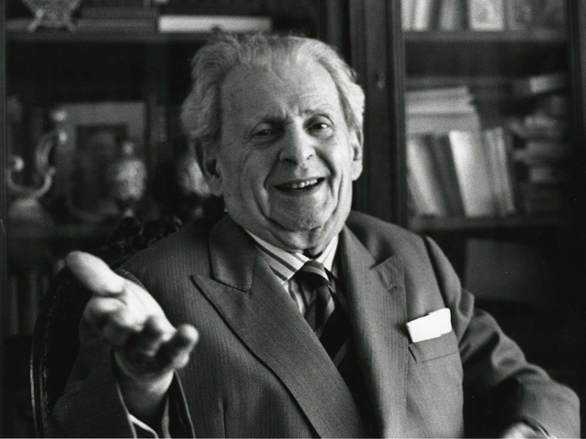philosophy of the other
There are many people on the Internet talking about the concepts of freedom and existentialism in Attack on Titan, but the starting point of these philosophies is "I", not "the other". ignore. In addition, what is the meaning of the existence of "I" in a world that has eliminated others. It is precisely in this way that the French philosopher Emmanuel Levinas (1906-1995) constructed the " philosophy of the other". Other; or the ethics of others).

The Birth of the Philosophy of the Other
Born in Lithuania to a Jewish family, Levinas studied at the University of Strasbourg in France in 1923, during which time he studied phenomenology by Edmund Husserl (1859~1938). He was deeply attracted, so he went to the University of Freiburg in Germany to study phenomenology with Husserl and Heidegger (Martin Heidegger, 1889~1976; student of Husserl), and returned to France the following year to complete his doctoral dissertation " The Theory of Intuition in Husserl's Phenomenology also established Levinas as "the first person to introduce German phenomenology into France".
However, Heidegger, whom he admired very much, swore to join the Nazi Party in 1933, and used the power of the president of the University of Freiburg to persecute many Jewish academic elites including Husserl, which made Levinas to his own Worship was deeply ashamed and began to wonder whether Heidegger's embrace of the Nazis was an accident of history or a logical necessity .
During this period of reflection, World War II broke out. Levinas was captured shortly after his enlistment, and spent the next five years in a hopeless prisoner of war camp, while his relatives in Lithuania were all killed. This great grief prompted Levinas to reflect on war, violence, morality, and the meaning of existence, and finally transformed it into a "philosophy of the other".
To understand all things with only one's own point of view is a kind of violence. This kind of violence is destroying the diversity and difference of life, and is leading mankind to a meaningless universe. — Emmanuel Lévinas

philosophy of the other
Levinas believes that most of Western philosophy, from the ancient Greek philosopher Parmenides (514 BC~? BC) to the German philosopher Heidegger , is a "philosophy of totalization", especially It is Hegelian ontology and Heidegger ontology.
In pursuit of wholeness, they violently reduce the Other (referring to another inner world that has an inner world like oneself) into the same (the same) , and think that the other is the other me, The other and the self have the same point of view, and a philosophy that exalts the self so much tends to slip into the neglect of others, and even slavery and the emergence of the Nazis made Heidegger calm after the Nazis’ crimes against the Holocaust were revealed. Di said this shocking statement: "Agriculture has today become a mechanized food industry, which is essentially the same thing as making corpses in a gas chamber." This holistic philosophy is called totalitarian philosophy.
Being precedes beings, ontology precedes metaphysics, that is, freedom precedes justice. It is a kind of moving towards the same before fulfilling obligations to the other. — Emmanuel Lévinas
Therefore, Levinas picked up the great hammer of thought[1] and knocked on the ontology base of "I am right". He proposed an ethics centered on the "other", and through " the face of the Other", I saw the transcendence of the other (transcendence; that is, infinity, which means that others have their own The life and inner world that I cannot know, has infinite possibilities) and vulnerability (vulnerability; others can be hurt by me, but also because seeing his face awakens my goodness, and makes me dare not kill , let me take responsibility), let me as a being go out of myself, face the other, and then destroy the wholeness through "dialogue" [Note 2], let me stop turning a deaf ear to the other, but start to understand him the thoughts of others, and begin to assume the ethical responsibility of serving others.
I refuse to use visual notions to describe genuine relationships with others; it is dialogue, or more precisely, response or responsibility that is genuine relationship. — Emmanuel Lévinas
In conclusion, Levinas' philosophy of the other, or the ethics of the other, rationalizes war and violence by denying the highest truth, and then affirming the pluralism and transcendence through the face of the other , as well as affirming a utopia under an ethics-led politics, fulfilling absolute responsibility to others and rebuilding social justice with an attitude of no longer indifference to the suffering and death of others.
Therefore, for Levinas, ethics is the first philosophy, because the relationship between people is the proof of my own existence and the premise of my communication with God (only through the ethical relationship between people God makes sense), and love always takes precedence over knowledge and wisdom , so I use knowledge and wisdom to serve love, not love to serve knowledge and wisdom. But no matter whether ethics is important as the first philosophy, and whether the philosophy of others is too ideal, in this era of more and more developed science, technology, and economy, ethics, especially the philosophy of others, will only become more and more prominent. Importance [Note 3].
Man's ethical relation to the other is prior to "his ontological relation to himself," or to the totality of what we call the world. — Emmanuel Lévinas
[Note 1]: There are two great hammers of thought in the history of philosophy, one is to wake people up from the dream of "God", and the other is to wake people up from the dream of "I". Friedrich Nietzsche (1844~1900) declared the death of "God" in the Philosophy Palace Square, giving birth to the "Superman" with a will to life and power; Levinas declared the totalitarian "self" in the philosophy prisoner of war camp The disintegration of , saves the "other" who has been imprisoned for a long time.
[Note 2]: This also echoes the Indian philosophy that we should pursue the truth in each other's heart, not the harmony on the surface. For more details, see last year's article "Interpersonal Relationships Through Indian Philosophy".
[Note 3]: Many ideas in the philosophy of the Other actually coincide with Confucianism, a traditional Chinese philosophy, such as benevolence, Datong and the world.
Like my work? Don't forget to support and clap, let me know that you are with me on the road of creation. Keep this enthusiasm together!

- Author
- More